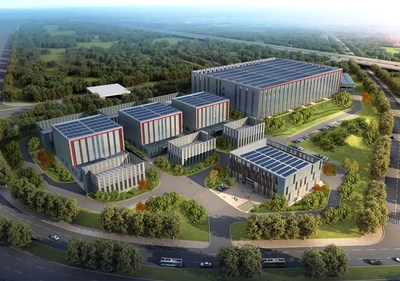شينزين، الصين، 22 فبراير 2022 — /PRNewswire/ نظرًا لأن الحياد الكربوني أصبح المهمة الأكثر إلحاحًا في العالم، فإن الطلب على مراكز البيانات منخفضة الكربون والصديقة للبيئة آخذ في الازدياد. وتستعد شركة هواوي -المزود الرائد للبنية التحتية الرقمية- لعرض حل مركز البيانات الجاهز والموفر للطاقة الذي يعمل بنظام الوحدات في مؤتمر الجوَّال العالمي المقبل لعام 2022 (2022 MWC)، والذي سينعقد في الفترة من 28 فبراير إلى 3 مارس في برشلونة، بإسبانيا.
من أجل مواجهة التحديات التي تواجه مراكز البيانات التقليدية، تلتزم هواوي بمفهوم التصميم “بنظام الوحدات + الذكي” وتعيد تشكيل البِنية الهندسية المعمارية، والتبريد، والتشغيل والصيانة، وإمدادات الطاقة من أجل بناء مراكز بيانات مبسطة وصديقة للبيئة وذكية وآمنة من الجيل المقبل. ويُستخدم حل هواوي على نطاق واسع في بناء مراكز بيانات صديقة للبيئة ومنخفضة الكربون، مما يساعد شركات الاتصالات على تحقيق أهداف حيادية الكربون وتحسين أداء مراكز البيانات.
قم ببناء مركز بيانات من الجيل المقبل في أربع خطوات
تُجبِر الخدمات الرقمية الموسعة مراكز البيانات على توسيع نطاق البِنية التحتية والارتقاء بالبِنية الهندسية المعمارية. وقد أصبحت عمليات البناء، والتوزيع، والتشغيل والصيانة، والإدارة تستغرق وقتًا طويلاً وتتطلب عمالة مكثفة. وتشعر شركات الاتصالات بالانزعاج بسبب فترة البناء الطويلة، والاستهلاك العالي للطاقة، وصعوبة التشغيل والصيانة، وانخفاض الموثوقية لحلول مراكز البيانات التقليدية.
يوفر مركز البيانات بنظام الوحدات مسبقة الصنع حلاً مثاليًا. ويتيح وضع البناء الشبيه بلعبة مكعبات الليجو تكوينًا وتجميعًا مرنان للوحدات المختلفة. ويُمكِن بناء مراكز البيانات وتوسيعها بسرعة، مما يؤدي إلى تقصير فترة البناء وخفض التكاليف. كما يُمكِن تطبيق هذا الحل بسرعة على مراكز البيانات الكبيرة التي تتطلب عمليات توسيع متكررة، وخاصة مراكز بيانات شركات الاتصالات.
وقد استحدثت هواوي أربع خطوات من أجل المساعدة في تخطيط وبناء وإدارة الجيل المقبل من مراكز البيانات الذكية الصديقة للبيئة، وتشمل إعادة تشكيل البِنية الهندسية المعمارية، وإعادة تشكيل التبريد، وإعادة تشكيل التشغيل والصيانة، وإعادة تشكيل إمدادات الطاقة.
1. إعادة تشكيل البِنية الهندسية المعمارية: في الوقت الحاضر، أصبحت مراكز البيانات بنظام الوحدات مسبقة الصنع هي المعيار القياسي في هذه الصناعة. ويتيح نهج الوحدات مسبقة الصنع التسليم المبسط، مما يقلل دورة البناء من أكثر من 18 شهرًا إلى أقل من ستة أشهر. هذا يلبي الطلب على إطلاق الخدمة بسرعة. كما يتميز مركز البيانات بنظام الوحدات مسبقة الصنع من هواوي بمعدل تجميع يبلغ 97٪، ولا يُنتِج نفايات سائلة أو غازية أو صَلبة أثناء عملية البناء. كما ينخفض استهلاك مياه البناء والنفايات بنسبة 80٪، ومعدل الاسترداد أعلى من 80٪، وتقل انبعاثات الكربون الناتجة عن البناء بنسبة 90٪، مما يحقق البناء الصديق للبيئة طوال دورة حياة النظام.
2. إعادة تشكيل التبريد: يستهلك نظام التبريد معظم الكهرباء في مركز البيانات، لذا يتم التركيز على توفير الطاقة وتقليل الانبعاثات. وتعمل تقنية iCooling الرقمية من هواوي وحل التبريد التبخيري الغير مباشر اللذان يزيدان من استخدام مصادر التبريد المجانية على تعظيم قيمة كفاءة استخدام الطاقة (PUE) لمراكز البيانات بنسبة تتراوح بين 8٪ و 15٪.
3. إعادة تشكيل التشغيل والصيانة: يتميز حل مركز البيانات بنظام الوحدات مسبقة الصنع من هواوي بالتشغيل والصيانة الرقمية الذكيان، واللذان يتيحان التشغيل والصيانة المستقلان لمراكز البيانات، مما يقلل من تكاليف التشغيل والصيانة بحوالي 35٪. وبالإضافة إلى ذلك، تعمل إدارة سعة الأصول المنقحة والذكية على تحسين استخدام الموارد بحوالي 20٪.
4. إعادة تشكيل إمدادات الطاقة: لتلبية الطلبات على الخدمات المتزايدة، يجب أن تعتمد مراكز البيانات من الجيل المقبل على تصميمات قياسية بنظام الوحدات من أجل ضمان الموثوقية العالية والاستقرار الشديد. لذلك، يتم اعتماد حلول تصميم N+1، أو N+X، أو حتى 2N لإمدادات الطاقة والتبريد للأجهزة الأساسية من أجل تحقيق مستويات أمان أعلى. واستنادًا إلى مفاهيم “سيليكون أكثر، نحاس أقل” و “بطاريات ليثيوم أكثر، بطاريات رصاص حمضية أقل”، بالإضافة إلى الصيانة التنبؤية المستندة إلى الذكاء الاصطناعي، يَستخدم حل مركز البيانات بنظام الوحدات مسبقة الصنع من هواوي وحدات تزويد طاقة غير قابلة للانقطاع (UPS) عالية الكثافة وعالية الكفاءة، ويقوم بإدارة جميع وصلات نظام إمدادات الطاقة والتوزيع بطريقة مرئية، مما يؤدي إلى التحول من الصيانة السلبية إلى الصيانة الاستباقية. تضمن هذه التدابير التشغيل المتواصل والمستقر لمراكز البيانات.
لمعرفة المزيد حول حلول مراكز البيانات بنظام الوحدات مسبقة الصنع من هواوي، يُرجى زيارة الجناح الخاص بنا: 1H50، قاعة فيرا جرانت فيا 1 (FIRA GRANT VIA Hall 1)، في الفترة من 28 فبراير إلى 3 مارس. وبالإضافة إلى ذلك، يمكنك أيضًا متابعة “قمة هواوي للطاقة الرقمية” في الأول من مارس، والتي ستجمع بين صانعي السياسات، وقادة الصناعة، والخبراء من أجل مناقشة اتجاه التنمية للشبكات صديقة البيئة، ومنخفضة الكربون، والتقنيات المبتكرة، وأفضل الممارسات. رابط البث المباشر المتاح للقمة: https://live.huawei.com/mwc/
الصورة – https://mma.prnewswire.com/
